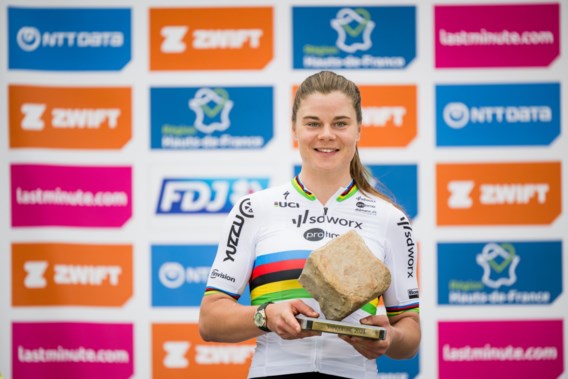At the end of two eventful weeks in which Wout van Aert and Remco Evenepoel were eliminated, the third figurehead of Belgian cycling managed to put a big smile on the faces of the supporters once again. The Brabançonne blared through the speakers for Lotte Kopecky on Saturday evening over the famous velodrome in Roubaix.
The world champion lifted the cobblestone trophy after an edition in which she was the most enterprising: a first gear seventy kilometers from the end, another bomb on the cobblestones of Auchy-lez-Orchies, a third shot on the ascending asphalt strip after the five-star stretch of Mons-en-Pévèle, open the throttle again on Camphin-en-Pévèle and a fifth flare on the stones of Gruson.
However, one rider would not be able to get Kopecky out of her wheel for a moment: the Dutch cannibal Marianne Vos, who had already been identified in advance as her most dangerous competitor and who was faster on paper in the sprint. “Marianne was not ideal,” Kopecky said after the match. “I wanted to win today myself, but if a situation arose where we could go for a sprint with Lorena (Wiebes, ed.), I was 110 percent prepared to do so.”
In the final, Kopecky cleverly played off the fact that her Dutch teammate was part of the chasing group. The Antwerp native, who emigrated to East Flanders, also showed off her racing intelligence when Ellen van Dijk attacked four kilometers from the finish. She reacted lightning quickly and thus prevented Lidl-Trek from cashing in on their lead group.
Freshness over speed
Although “everything went according to plan” – Kopecky said afterwards – many in the center square of the velodrome did not have a good view of the world champion’s chances. With the prospect of a sprint against not only Vos, but also the fast Elisa Balsamo, third place seemed to be the highest achievable. “When you come to the track, you have to have confidence in yourself that you are capable of finishing,” Kopecky said. “Before turning onto the track it was already a fierce battle for positions. I also knew that Marianne and Elisa would duel each other and that there was a headwind on the other side of the track. I stayed calm, went at the right time.”
From an apparently lost position, Kopecky pulled off a mighty sprint and sent Balsamo, Pfeiffer Georgi and Vos to the closest places of honor. “The fact that it was a long sprint was to my advantage,” said Kopecky. “After a grueling race like Paris-Roubaix, it is less about speed than about freshness,” runner-up Balsamo said after drying her tears of disappointment.
Less dominant
Paris-Roubaix is Kopecky’s fifth victory in a season that started promisingly in the Tour of the Emirates at the end of February. Then she achieved her first victory ever in a stage with an uphill finish plus the final win. Although she subsequently also won the Strade Bianche and Nokere Koerse, it was soon said that the world champion looked less dominant and flashy than last season.
The latest Flemish classics were grist to the critics’ mill. After Dwars door Vlaanderen, sports director Danny Stam noted that the entire team, including Kopecky, had not been sharp enough. In the Tour of Flanders, the world champion had to bow her head too much on the slopes. “In the Tour of Flanders the feeling was not what I wanted,” Kopecky said in Roubaix. “I tried to stay as calm as possible. Fortunately, I have very good friends and a strong team behind me who continued to give me confidence. We had a lot of laughs over the past two days, so I had my nerves under control this morning. I felt that they believed in me and I tried to take that feeling into the match.”
Main goal
In the Hell Classic, Kopecky showed mental toughness. On the track of Roubaix she gave the best possible response. With the blow, the question was no longer whether she would be better off hiring a full-fledged trainer or remaining her own trainer. And she was praised for the series of results she achieved in the classics this spring, with, in addition to wins in the Strade Bianche, Nokere Koerse and Paris-Roubaix, podium places in the Omloop Het Nieuwsblad and the Trofeo Alfredo Binda and top five finishes in Dwars door Vlaanderen and the Ronde of Flanders.
It was suddenly of little relevance that the fourth edition of Paris-Roubaix was the weakest so far, judging by the figure that the specialized website Procyclingstats assigns to the quality of the field of participants. And that of the top ten in the Tour of Flanders for Roubaix, apart from Kopecky, only Vos and Letizia Paternoster were present.
The conclusion after the Hell Classic was that Kopecky had won the race, which had become the main goal of her spring since her victories in the Strade Bianche and especially the Tour of Flanders. “For me, my world road title in Glasgow last year remains the greatest achievement I have ever achieved, but winning Roubaix in the rainbow jersey comes pretty close.”
In La reine des classiques, Kopecky confirmed her status as queen of the cobbled classics. Without pressure, she can now prepare for her last appointments this spring, the Amstel Gold Race and Liège-Bastogne-Liège. To then work confidently and without annoying questions towards her next big goal: the Paris Olympic Games.
Result: 1. Lotte KOPECKY (Team SD Worx) 148.5 km in 3h47’13” (avg.: 39.214 km/h); 2. Elisa Balsamo (Ita); 3. Pfeiffer Georgi (GBr); 4. Marianne Vos (Ned); 5. Amber Kraak (Ned); 6. Ellen van Dijk (Ned) 6”; 7. Lorena Wiebes (Ned) 28”; 8. Victoire Berteau (Fra); 9. Marie Le Net (Fra); 10. Kim Le Court Pienaar (Mri); 11. Elise Chabbey (Zwi); 12. Gladys Verhulst-Wild (Fra); 13. Letizia Borghesi (Ita); 14. Sophie Von Berswordt (Ned); 15. Evy Kuijpers (Ned); 16. Zoe Backstedt (GBr); 17. Christina Schweinberger (Oos) 1’05”; 18. Arlenis Sierra Canadilla (Cub); 19. Lieke Nooijen (Ned); 20. Marthe Truyen; 21. Letizia Paternoster (Ita) 2’14”; 22. Marta Lach (Pol); 23. Susanne Andersen (Noo); 24. Tiffany Cromwell (Aus); 25. Alessia Vigilia (Ita) 2’17”; 62. Julie De Wilde 7’41”; 63. Sanne Cant; 95. Alana Castrique 16’54”


